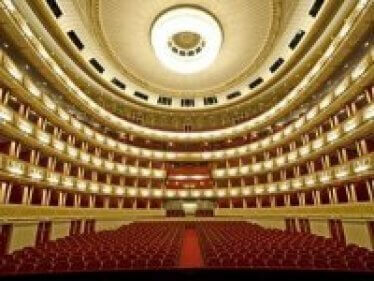Capriccio - Schedule, Program & Tickets
Capriccio
conductor
Philippe Jordan
Staging
Marco Arturo Marelli
Stage design and light
Marco Arturo Marelli
Costumes
Dagmar Niefind
choreography
Lukas Gaudernak
The countess
Maria Bengtsson
The count, her brother
Adrian Eröd
Flamand, a musician
Daniel Behle
Olivier, a poet
Andrè Schuen
La Roche, a theater director
Christof Fischesser
The actress Clairon
Michaela Schuster
The opera Capriccio describes the genesis of an opera. The plot describes a day in the drawing room of the young and art-loving widowed Countess Madeleine, who is at the center of the action. As a muse, Madeleine inspires the artists around her. Above all the poet Olivier and the composer Flamand, both of whom are in love with them, and hope to conquer the heart of the beautiful countess with their respective artistic creations, who, however, cannot choose either of them. There is also rivalry between Flamand and Olivier on the question of the meaning of poetry and music: should the word or the tone take precedence - prima la musica dopo le parole or, conversely, prima le parole dopo la musica? The two expect a decision in this regard from the countess's judgment, but she realizes that only the meeting of poetry and composition leads to the artistic ideal: "One is in the other and wants to the other". The practical theater director La Roche occupies a completely different position. For him, the only thing that counts is the theater with an appeal for the audience and catchy music. Accordingly, he wants to prepare a great homage game for the countess's birthday. The Countess, however, would like a new opera to be created instead of the outdated festival. The count, her brother, suggests "somewhat maliciously" that the events of the "today" day just experienced, including the heated discussions about the primacy of word and tone, should be chosen as an action. This idea finds general approval and society dissolves. The countess, who was left alone, reports to her steward that Olivier will visit her in the library the next morning to find out from her the end of the planned new opera, i.e. the final verdict on the primacy of word and tone. And with it your choice: Olivier or Flamand. Since Olivier will appear in the library at the same hour as Flamand, whom the Countess has already promised to meet there, there will be no decision again. The end of the opera remains open. And asking Madeleine, to get an answer, turns to her reflection in the mirror: "Is there a conclusion that is not trivial"?
Subject to changes.
Philippe Jordan
Staging
Marco Arturo Marelli
Stage design and light
Marco Arturo Marelli
Costumes
Dagmar Niefind
choreography
Lukas Gaudernak
The countess
Maria Bengtsson
The count, her brother
Adrian Eröd
Flamand, a musician
Daniel Behle
Olivier, a poet
Andrè Schuen
La Roche, a theater director
Christof Fischesser
The actress Clairon
Michaela Schuster
The opera Capriccio describes the genesis of an opera. The plot describes a day in the drawing room of the young and art-loving widowed Countess Madeleine, who is at the center of the action. As a muse, Madeleine inspires the artists around her. Above all the poet Olivier and the composer Flamand, both of whom are in love with them, and hope to conquer the heart of the beautiful countess with their respective artistic creations, who, however, cannot choose either of them. There is also rivalry between Flamand and Olivier on the question of the meaning of poetry and music: should the word or the tone take precedence - prima la musica dopo le parole or, conversely, prima le parole dopo la musica? The two expect a decision in this regard from the countess's judgment, but she realizes that only the meeting of poetry and composition leads to the artistic ideal: "One is in the other and wants to the other". The practical theater director La Roche occupies a completely different position. For him, the only thing that counts is the theater with an appeal for the audience and catchy music. Accordingly, he wants to prepare a great homage game for the countess's birthday. The Countess, however, would like a new opera to be created instead of the outdated festival. The count, her brother, suggests "somewhat maliciously" that the events of the "today" day just experienced, including the heated discussions about the primacy of word and tone, should be chosen as an action. This idea finds general approval and society dissolves. The countess, who was left alone, reports to her steward that Olivier will visit her in the library the next morning to find out from her the end of the planned new opera, i.e. the final verdict on the primacy of word and tone. And with it your choice: Olivier or Flamand. Since Olivier will appear in the library at the same hour as Flamand, whom the Countess has already promised to meet there, there will be no decision again. The end of the opera remains open. And asking Madeleine, to get an answer, turns to her reflection in the mirror: "Is there a conclusion that is not trivial"?
Subject to changes.
There are no products matching the selection.


